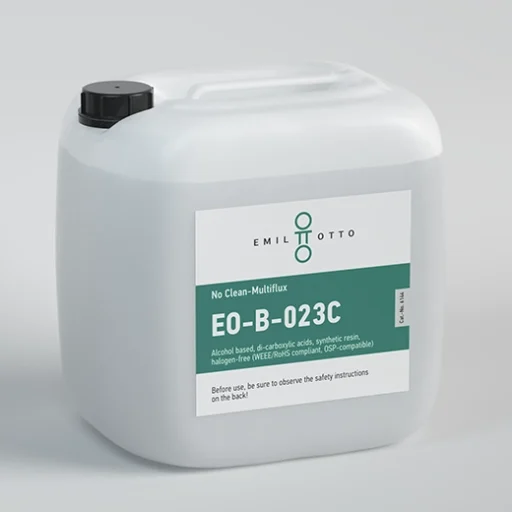No Clean-Flux, alcohol-based
Resin-carboxylic and di-carboxylic acid complex, halogenide-free (WEEE/RoHS compliant)
Type ISO-9454: 1231 (1.2.3.A) // DIN EN-61190-1-1 (acc. J-STD-004) (IEC: REL0)

| Appearance/smell: | transparent to yellowish, amber liquid |
| Hazardous goods: | Yes |
| Solids content: | 4.0 wt.-% |
| Acid number: | 10 – 12 mg KOH/g |
| Halogenide-free: | Yes |
| Resinous: | Yes |
| Available as concentrate: | Yes |
| Density at 20 °C: | 0.795 (+/- 0.003) g/ml |
| Flash point: | 12 °C |
| Durability: | 12 months |
| Storage (recommendation): | store at 5 – 25 °C, dry, sealed |
EO-B-023C is universally suitable for wave, selective and hand soldering of PCBs as well as strand tinning and complies with specification DIN-EN 61190-1-1: L0. Accordingly, it contains organic, halogen-free activating additives with resin in a combination specially tuned to the thermal requirements of the soldering processes. EO-B-023C can be applied by brushing, spraying, dipping etc. The solids content is 4 wt.-%. EO-B-023C is totally free from corrosion action. Additional information on the ingredients (hazardous substances), safe handling, storage, transport and disposal can be found in the current safety data sheet (SDS, SDS, MSDS).
This flux is very versatile. There are good results for manual, wave and selective soldering as well as for cable assembly / wire tinning. The general rule of applying fluxes applied in principle as low as possible also applies to this product.
Sprayfluxing: If possible, try at first a quantity of 15 – 30 ml/min. and observe the distribution of the flux. After that, correct the quantity. Air-pressure: 18 – 20 l/min.
Preheating: Entering the solder-wave, the temperature on the topside of the pasteboards should be 80 – 110 °C, dependent on type of boards, layout etc. In case of using lead-free solders, preheating temperatures of 100 – 130 °C on the topsides are possible.